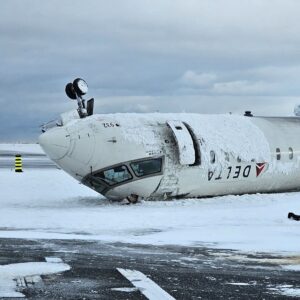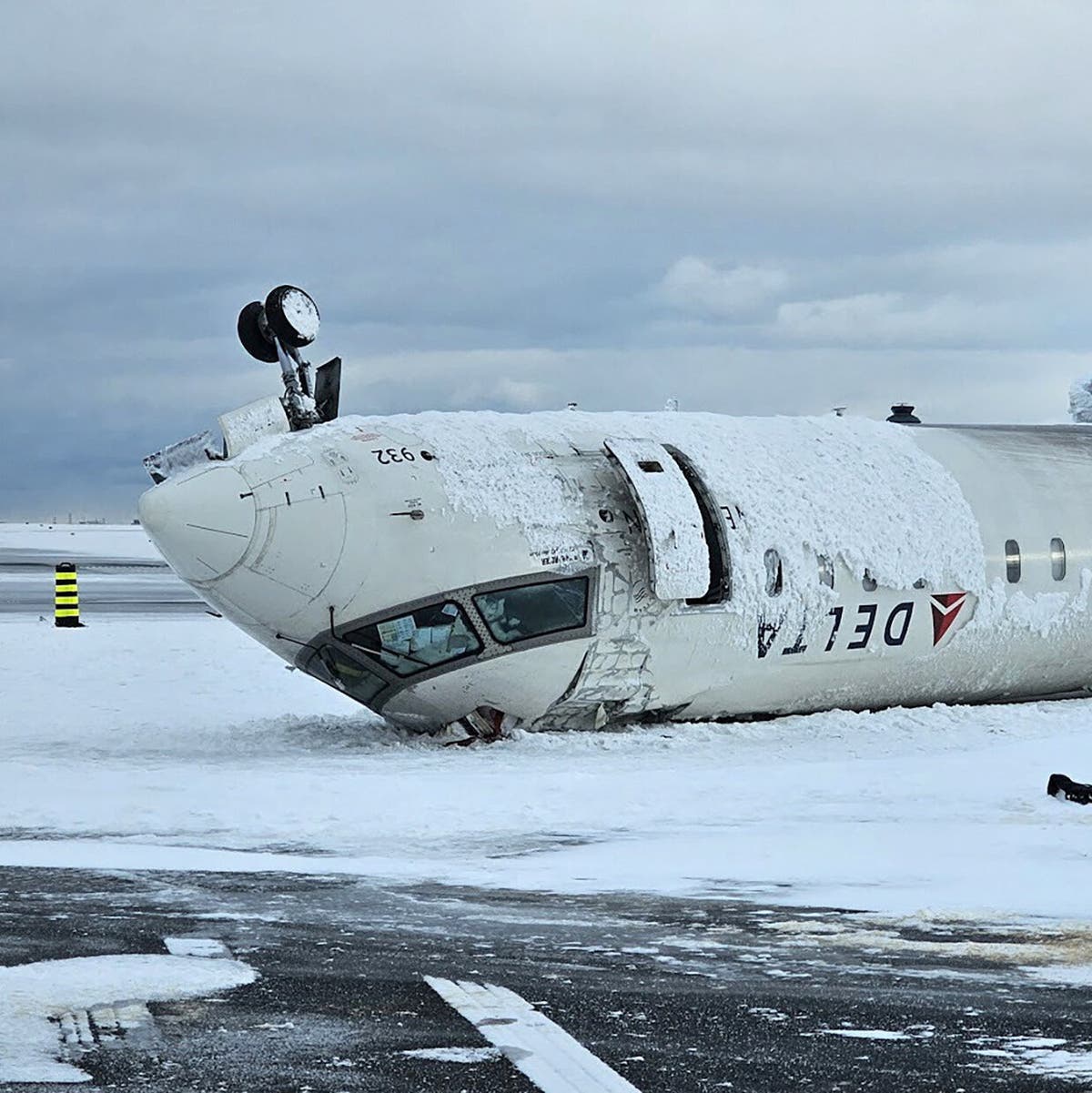
The passengers of Delta Flight 4819 are still reeling from shock after their flight from Minneapolis crash-landed at Toronto Pearson International Airport, flipping upside down and shearing off its right wing. Despite the terrifying accident, all 80 onboard—76 passengers and four crew members—survived. In what the airline calls a gesture of goodwill, Delta Air Lines has offered each passenger $30,000 in compensation.
The offer, which the airline insists comes with “no strings attached,” has drawn mixed reactions from survivors, legal experts, and aviation analysts. While some passengers are relieved by the immediate compensation, others are questioning whether Delta is trying to preempt potential lawsuits.
The crash occurred on Monday as Flight 4819 attempted to land in rough weather conditions. The aircraft touched down hard, lost control, and rolled over, coming to a stop belly-up on the tarmac. Eyewitnesses described the scene as chaotic, with emergency crews rushing to evacuate stunned passengers from the overturned jet.
While the majority of passengers walked away with minor injuries, 21 were taken to hospitals for further medical evaluation. By Wednesday morning, all but one had been released, according to Delta. The airline has not disclosed the nature of the remaining hospitalized passenger’s condition.
Delta wasted no time in reaching out to survivors, offering $30,000 per passenger in what it describes as a “no-strings-attached” payment. The company emphasized that accepting the money would not affect passengers’ legal rights, likely in an effort to quell concerns about liability.
A Delta spokesperson confirmed via email:
“We recognize the distress this incident has caused and want to assist our customers in any way we can. This payment is a gesture of goodwill and does not limit their legal rights.”
However, some passengers remain skeptical. Legal experts warn that despite the airline’s assurances, passengers should be cautious about accepting compensation before fully understanding their legal options.
As the dust settles, legal action is already brewing. Canadian law firm Rochon Genova has confirmed that it has been retained by multiple passengers, suggesting potential lawsuits on the horizon.
Aviation lawyer Daniel Rochon stated:
“While Delta’s offer is a step in the right direction, we need to ensure that all affected passengers receive fair treatment, especially if they suffer long-term physical or psychological trauma.”
The firm is expected to investigate whether negligence played a role in the crash and whether Delta’s compensation offer is sufficient given the emotional and physical toll on survivors.
Authorities have remained tight-lipped about the cause of the crash. Delta CEO Ed Bastian appeared on CBS on Wednesday, confirming that the flight was staffed by an “experienced crew” but declined to provide further details.
Meanwhile, investigators from Canada’s Transportation Safety Board (TSB) are examining the aircraft’s black box, pilot communications, and weather conditions at the time of landing.
In a separate statement, the TSB noted:
“Our team is thoroughly analyzing the circumstances leading up to this incident. The priority is to determine the root cause and prevent future occurrences.”
The damaged aircraft has since been removed from the runway, restoring operations at Toronto Pearson International Airport, which had been partially disrupted due to the crash.
Survivors of Flight 4819 have shared harrowing accounts of their ordeal. Many describe the moment the plane flipped over as surreal, with luggage flying and passengers screaming.
John Michaels, a Minneapolis resident who was onboard, recalled:
“One second we were landing, the next we were upside down. I thought it was over. I’m grateful to be alive, but this will stay with me forever.”
For some, Delta’s immediate compensation has been welcomed as a much-needed relief. Others, however, remain uncertain about whether it is truly sufficient.
One passenger, who preferred to remain anonymous, said:
“Thirty thousand dollars is helpful, but what if I develop PTSD? What if I can’t fly again? Delta needs to do more than just write a check.”
The coming weeks will determine the true extent of Delta’s liability. If the investigation finds that pilot error, mechanical failure, or inadequate safety protocols contributed to the crash, the airline could face lawsuits far beyond the $30,000 payouts.
Passengers are being advised to consult legal professionals before accepting any compensation, ensuring they are fully aware of their rights.
For now, survivors are left to process their near-death experience, thankful to be alive but uncertain about what comes next. Delta’s compensation offer is just the beginning of what may become a long legal and emotional battle.
As Flight 4819 passengers attempt to move forward, the aviation industry will closely watch how Delta handles the aftermath of this near-tragedy. Will the $30,000 payments be enough to satisfy survivors, or is the airline bracing for a legal storm?
One thing is clear: the scars of this crash will last far beyond the moment the plane flipped upside down on that Toronto runway.




